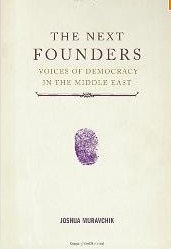Joshua Muravchik
The Next Founders: Voices of Democracy in the Middle East

Seven stories of seven heterodox men and women of Islamic countries. I thought this book would be a lot of academic jargon, abstract discussion, high politics and geopolitics all mixed up, even though I had already read a book by Mr. Muravchik on Socialism and, thus, harbored some hope this book would be made as easy as possible to follow by the general reader. My hope was exceeded: the book tells the close-up stories of seven individuals from seven different Islamic countries who felt attracted to the liberalism and open societies of the West, who chose to differ from the religious and political authoritarianism of their countries' rulers, and finally decided to risk their lives defending freedom of speech, or religion, and to the protection of human rights. Most came to the Unites States and could get to know the “enemy” state, as their ruling classes would put it, and came to love America and the beliefs for which it stands. But one thing, above all the rest, does unite these now middle-aged group of men and women, and that is courage and ingenouity.
Each life is a wonderful story; told with the easiness and craft of a masterful writer. Intense lives. We grow and become adults along with the characters as we read. We come to understand why these individuals chose freedom and human rights and repudiated intolerancea and authoritarianism. In the end, the way of life the Islamic countries gave themselves, they figured out, is just an excuse for their mullahs, their corrupt ruling classes: religious leaders hand-in-hand with the secular politicians, to have all the power safely kept for themselves, generation after generation. Religion is just a tool. The ayatollahs themselves are the greatest hypocrats, whose lives do not agree with their preaching, and couldn't care less for their religion and more for power-grabbing, sex and wealth.
The men and women of these real stories had to fight first against their own doubts and inner misgivings, religion-wise and politics-wise. With hardly anyone to share thoughts and feelings; with tradition, cradle to grave indoctrination, and the totalitarian State all working against you, molding your heart and your mind into submission, it takes more than a simple dose of courage to stand up and fight the political and religious status quo. But we are in 2013 (the book was published in 2009), even in the Middle East. And with the new technologies and means of communication, and the more and more people being able to see for themselves the world outside the Islamic curtain, it is -and will increasingly be- easier for more and more young people to challenge the regime in each of their own countries. We are seeing big changes in the last few years: uprisings in most of the Middle East countries. Though not clearly democratic and liberal in their ideologies (they largely maintain their Islamic character, sharia law included), yet they are, I believe, a step forward in the right direction, that's why the heroes of this stories can be alluded to as the fathers of future democarcy in the Middle East.
This book is easy to read. It is passionately told and engaging. No need to look for cheap fiction stories. Here's the real deal: real men and women fighting to be free -specially in the case of women. They raise up their voices; we in the West should at least listen to them. If their regimes had been Catholic instead of Muslim, I bet you the liberal West would have done a lot more to put a stop to it long time ago, but we are no less hypocrats than the mullahs themselves.
